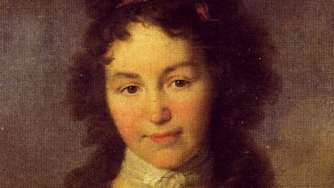
Of the many letters Caroline wrote to her lifelong friend Luise, one of the most intense (the 57th Letter) dates from seven years after the 4th Letter discussed in my last post. By then both were married; only a few months earlier Caroline had given birth to her first child (Auguste); though Luise already had children, Caroline knew that one of them was terminally ill. In the first paragraph Caroline describes how difficult Auguste’s birth was for her; in the second she consoles Luise over the impending death of her child. She thus subtly parallels birth with death and hence the labor for one with mourning over the other.
Fifteen years later, only a few months after the death of Auguste–the last of her four children to die–Caroline’s generally positive disposition evidenced in the 4th Letter and her experience in grappling with birth and death evidenced in the 57th Letter were being put to the test. Though she was holding up well, Friedrich Schelling (Friedrich), the man who was to be her third husband, seems to have been suicidal from feeling guilty (rightly or wrongly) for having failed to do enough to cure whatever illness killed Auguste. Caroline wrote frequently and urgently to him, offering advice and comfort. In one of those letters (274d) she characterizes the challenge of overcoming grief as a formula to be solved: “(death/pain) x (love/bliss) = (life/peace).” She terms this one of her ‘primal axioms’ (the “Ursatz”), although she seems playfully to concede to Friedrich that he or perhaps someone else shares responsibility for it.
At the time, however, Friedrich was only twenty five and had not fathered a child and would not do so until he remarried after Caroline’s death. He could not then have claimed to own either the intellectual or emotional ‘property rights’ to the Ursatz. His letters back to Caroline from then do not survive, but the essay on human freedom he published nearly nine years later (the “Essay”) deserves to be considered a product (Erzeugnis) of their letter writing as philosophical dialectic. Much of it is taken up with the theological implications of ‘death/pain’: how it is legitimate to speak of a “source of sadness” in God and how that relates to the human capacity to be and do evil and the existence of suffering generally: the manner in which there is a “veil of dejection that is spread over all nature, the deep indestructible melancholy of all life.” That language is immediately followed by (and hence subordinated to) an ostensibly purely psychological assertion that echoes the Ursatz: “Joy must have suffering, suffering must be transfigured in joy”(p62-3).
The Latin derivative ‘transfigured’ is the standard translation of the underlying German (verklärt). There is perhaps a better English equivalent. If the Ursatz is interpreted as a recipe, then what it would appear to contemplate is analogous to extracting an essence from a dead herb (suffering cleared up in joy). Indeed, years after the Essay was published Friedrich became interested in how an herbal essence can be understood to validate belief in life after death.
A recipe of some sort is implicit in how Caroline appeals to Luise in the 57th Letter to think of the “sweet repose” of her child after death, rather than the “bitter” memory of her suffering before death. The Essay’s ‘joy/suffering’ arguably also recalls Caroline’s telling Luise of her joy following her difficult labor in giving birth to Auguste. For the Essay also speaks about birth, both literally and metaphorically. “All birth is birth from darkness into light” (seed in ground/embryo in womb) is followed by “from the obscurity of that which is without understanding (from . . . yearning [Sehnsucht], the sovereign mother of knowledge) grow luminous thoughts”(p29). But ‘yearning,’ it is insisted, is not simple desire, rather something that involves labor: “the resistance of the yearning (das Widerstreben der Sehnsucht) that is necessary for any complete birth” (p31).
Consistent with Caroline’s concession to Friedrich about the originality of her Ursatz, there are any number of probable sources to be considered for much of the Essay (e.g., the “all birth” possibly echoes John 12:24). Still, read as the product of a dialogue, the primary source for the Essay’s basic theme and the passages just quoted (and surely others) would seem to be Caroline. Her contribution would be a logical extension of the Empedoclean epistemological principle (that like is known by like) invoked in the Essay’s opening paragraph. Caroline effectively appeals to that principle in yet another letter to Friedrich about Auguste’s death (278), telling him that he would never be able to “assimilate the mother’s grief completely.” The principle could well be further generalized to both the procedure (epistemology) and substance (ontology) of such disciplines as philosophy, theology and psychology.
The implications of such a generalization are revolutionary in every sense of the word–including its original meaning of ‘turning back.’ The principle is implicit in the ancient Greeks making the experience of motherhood a prerequisite for practicing family medicine (Phaenarete). Sappho seems to have appreciated the principle. In a poem she addresses to her “children” (S.58b)–and hence as a ‘mother’–she invites them to participate by dancing in a celebration of both birth and death.
First discovered/published only in 2004, and hence unknown to Caroline, the resonance of S.58b with her Ursatz is uncanny. One of its lines qualifies as being a ‘primal axiom’: it begins with a reference to the impossibility of not aging (a-geraon cf. ‘geriatric’) and ends with the verb for being born (genesthai cf. ‘genetic’): “unaging: such a human being–is not possible to be born”(S.58b.8). Its ironic iconicity (beginning with a reference to ending–ending with a reference to beginning (cf. Evening . . . Morning in S.104a), underscored by the repetition of the ‘g’) symbolizes sphericity: how ‘opposites’–center/circumference, physics/metaphysics, sweet/bitter, birth/death–are not just relative terms but inherently ‘coincidental.’
Notwithstanding that she did not know of S.58b, Caroline articulated elements of a philosophy of art (defined broadly, i.e. visual arts, music and poetry) and the “origin (Ursprung) and purpose of its existence (ihres Daseins)” that can be appropriately applied to interpret its significance further. As a threshold matter, however, the implications of a comment she made about her interpretation of art as having “nothing to do with Metaphysics” need to be explored. I intend to begin that exploration in my next post by revisiting the issue of Plato’s portrayal of Diotima that I touched upon only briefly in my first post on Caroline.
 Stuart Dean has a B.A. (Tulane, 1976) and J.D. (Cornell, 1995) and is currently an independent researcher and writer living in New York City. He has studied, practiced and taught Tai Chi, Yoga and related disciplines for over forty years. Stuart has a blog on Sappho and the implications of her poetry for understanding the past, present and future: http://studysappho.blogspot.com/
Stuart Dean has a B.A. (Tulane, 1976) and J.D. (Cornell, 1995) and is currently an independent researcher and writer living in New York City. He has studied, practiced and taught Tai Chi, Yoga and related disciplines for over forty years. Stuart has a blog on Sappho and the implications of her poetry for understanding the past, present and future: http://studysappho.blogspot.com/


“she seems playfully to concede to Friedrich that he or perhaps someone else shares responsibility for it.” I don’t know how the letter itself reads, but when I read this clause in your essay, I assumed she meant that Friedrich was responsible not for coming up with the axiom/idea, but rather for showing/offering the love that enabled her to transform her pain. You will have to tell us if this is how her letter reads.
LikeLike
I was summarizing but perhaps should have just quoted the entire passage for context. Prior to the axiom she refers to a form of expression known by the Greek derived term “philosopheme” used by F. Schlegel (the author of “On Diotima” that I discussed in my earlier post). She then says (you=Friedrich her future husband):
You will doubtless not want to press me too hard to reveal whence I derive my primal axioms in this regard. How irksome when one knows something for certain and then is also supposed to render an account of the source from whence one has it.
LikeLike
Reblogged this on dmariesings.
LikeLike
Thank you very much for reblogging this!
LikeLike
Reblogged this on Footnotes2Plato.
LikeLike
Thank you very much for reblogging this!
LikeLike
You’re very welcome. I was delighted to find your recent posts on Caroline. I’ve just completed my dissertation on Schelling’s philosophy of nature. The personal details you provided were enlightening, especially as regards Caroline’s influence on Schelling’s 1809 “Freedom” essay. Any sense for how much Caroline may have contributed to his unfinished dialogue “Clara”?
LikeLike
Glad to hear that. Because Clara was done after her death that is a tougher call to make. Given the level of interest in Heidegger and his emphasis on the Freedom Essay I wanted to focus on that. I hope to have more on Caroline’s interest in art and A. Durer in particular as it relates to the absorption of ancient Greek female spirituality (ie nature worship) via art rather than texts.
LikeLike